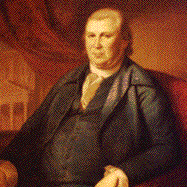Morris, Robert

Morris, Robert (1734-1806) Financier: Morris was the son of an English merchant, and was apprenticed to a major mercantile house in Philadelphia. He became a full partner in the firm of Willing and Morris, and became a patriot supporter. Representing Pensylvania in Congress in 1775, he opposed the Declaration of Independence, but agreed to sign it. Morris was an important figure in the Continental Congress, and was appointed Superintendent of Finance and Agent of Marine in 1781. Along with Haym Salomon, Morris became Financier of the Revolution, tying up his personal resources with the war effort. Morris' work was crucial in providing resources for the Yorktown campaign, which effectively ended the war. He founded the Bank of North America in 1781, the first commercial bank of its kind in the country, chartered by Congress and funded by a French loan. In addition, Morris helped support the American Army after the war, until it was disbanded in 1783. After the war's end, he became concerned with his economic vision for the United States, urging Congress to establish a stronger central government and an atmosphere conducive to a flourishing economy. His financial suggestions foreshadowed Alexander Hamilton's policies. After the demobilization of the army, Morris lost influence ove American finances, but served in the Pennsylvania legislature, the Constitutional Convention, and Congress. Beginning in the mid-1780's, Morris attempted to implement a series of financial schemes, including a plan to buy America's debt to France and sell it to investors from the Netherlands. These investment strategies were unsuccessful, and led to his emprisonment for debt. After three years in prison, he was released in 1801 under the new National Bankruptcy Law. His family was saved from financial ruin by the wise financial strategies of his wife, Mary White Morris..
 >
>